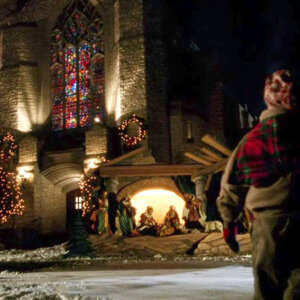I plunked down to watch Home Alone with my kids recently as one of them had it playing in the living room. I initially thought to myself, “You guys watch this movie all the time…” Their interest is ironic to me as the film isn’t even from their generation. I’m no different though. When I’m working remotely and need some background noise, I have my usual albums on shuffle: Charlie Parker Live in Montreal 1957, Miles Davis Kind of Blue (Legacy Edition), and Herbie Hancock Maiden Voyage (with that sublime trumpet solo by Freddie Hubbard). So, yeah, I get it about the repetitive enjoyment of beloved classics, even those that predate your own era, while enduring throughout generations (incidentally, Home Alone entered the national registry this month).
We all know the movie’s premise: little Kevin McCallister has been inadvertently left behind (no, he didn’t miss the rapture) as his family rushes off to the airport for their holiday vacation in France. Upon discovering he has been neglected, he realizes he must now do his own laundry, shop for himself, fend for himself, “eat junk and watch rubbish”, etc.. Initially, it’s fun as we see in the famous shaving scene (the juvenile equivalent of Tom Cruise’s living room slide in Risky Business) or the comedic interrogation by the grocery store cashier.
When the infamous wet bandits chance upon Kevin for the second time in the film (of note is that Harry is literally disguised as ‘the law’ in their first encounter), he realizes he is in trouble and knows he must come up with a scheme to defend the McAlister household. Cue, the hilarious Angels with Filthy Souls scene as he creatively finds ways to convince the burglars he’s not actually alone (I love that he hides under scarlet colored covers when they initially attempt to break in). Harry and Marv eventually see through the ruse and commence their plan to break in.
You’re always welcome at Church
 Where we approach the film’s crux though is the iconic moment where a wearied Kevin attends a church service. He is accosted by his mysterious neighbor Old Man Marley whom Kevin’s older brother, Buzz has insisted is a misanthropic recluse with sinister inclinations (The South Bend Shovel Slayer). They begin a conversation that is pivotal to the narrative. After Marley asks, “have you been a good boy this year?”, Kevin cannot definitively answer in the affirmative. Marley graciously responds, “I figured” and what unfolds is an entire confessional moment that becomes the most somber point in the film – further heightened by the background music in which we hear the ethereal echoes of an angelic youth choir. Mutual encouragements to forgive family members abound, replete with allusions to redemption.
Where we approach the film’s crux though is the iconic moment where a wearied Kevin attends a church service. He is accosted by his mysterious neighbor Old Man Marley whom Kevin’s older brother, Buzz has insisted is a misanthropic recluse with sinister inclinations (The South Bend Shovel Slayer). They begin a conversation that is pivotal to the narrative. After Marley asks, “have you been a good boy this year?”, Kevin cannot definitively answer in the affirmative. Marley graciously responds, “I figured” and what unfolds is an entire confessional moment that becomes the most somber point in the film – further heightened by the background music in which we hear the ethereal echoes of an angelic youth choir. Mutual encouragements to forgive family members abound, replete with allusions to redemption.
Immediately after this scene, something happens – as Kevin makes his way home, Christmas lights literally turn on as he runs past them, signifying the proverbial lightbulb igniting in his mind. In short, he has emerged from church feeling victorious and consequently brandishes a literal blueprint, a battle plan, consisting of the intricately devised booby traps he plans to set for the burglars. The thought that crossed my mind is that this is how many Christians view church: a place we go to get our battle plan or our marching orders for the week, when instead, it’s a place to receive grace in word and sacrament and then go to our respective vocations to live by faith. Consider Michael Horton‘s words on this.
We come to church, it seems, less to be transformed by the Good News than to celebrate our own transformation and to receive fresh marching orders for transforming ourselves and our world. Rather than being swept into God’s new world, we come to church to find out how we can make God relevant to the “real world” that the New Testament identifies as the one that is actually fading away. Most Americans believe in God, affirm that Jesus Christ is in some sense divine, and believe that the Bible is the Word of God…Judging by its commercial, political, and media success, the evangelical movement seems to be booming. But is it still Christian?
It’s noteworthy that the one place in the entire movie where Kevin is actually safe exists at church where he incidentally interacts with a strange and mysterious neighbor. Marley intimates the church’s capacity as a sanctuary with the poignant line, “you’re always welcome at church”. Ironically, Kevin is alone in his parents’ wealthy home in an affluent suburb, yet he’s not safe – his dwelling place is not impenetrable. Yet, when he emerges from church, he feels ready to face adversity and opposition because after all, he now has the battle plan! At that moment, the tempo of the music (Carol of the Bells) becomes more upbeat and contemporary as we transition away from the serene singing of the angel choir. The implication is unmistakable: our protagonist has found the answer to his problem – he now knows ‘what to do’. For those of us who prefer to be protagonists in our own narrative (everyone), matters pertaining to God, church, Christianity, religion, and faith concern finding answers to life’s most challenging problems. People are more apt to want to listen to ministers who come across more like life coaches than actual preachers who can rightly divide law and gospel. Indeed the church at times mirrors the world. Even while I was doing my Christmas shopping, I noticed that at Barnes & Noble at least, the ‘self help’ is now ‘self transformation‘. The world is obsessed with these concepts of transforming and becoming the best version of ourselves we can manifest. Everyone wants that practical advice for successful living instead of good news about a rescue accomplished outside of ourselves and without our help.
Right-handed power
 What transpires in the final act is that for which Home Alone is most famous. It is here also where it parallels another holiday favorite (there’s just something about the Christmas season that brings out the theology of glory like little else can). The 1988 film, Die Hard bears a resemblance, even retaining an eerily similar opening title sequence. In both movies, the main protagonist is estranged from his family inside a building while having to improvise meticulous techniques to fend off criminal invaders. Both movies are known and celebrated for the clever stunts employed by the central character – most memorable for me is John McClane crashing through a window like John Shaft with a fire hose wrapped around his waist, shooting through the glass with his 9mm! Yet in both films, the plot isn’t resolved, the ‘day’ isn’t saved by the hero’s ingenuity or innate brawn but by a surprise rescue that no one really cares about, remembers (at least not consciously) or associates with the movie. How many people care or remember that John McClane was saved through an external rescue in Die Hard‘s final moments by an unexpected gun shot fired by his friend Al, the cop (incidentally, the only person with whom he became vulnerable throughout the entire film)?
What transpires in the final act is that for which Home Alone is most famous. It is here also where it parallels another holiday favorite (there’s just something about the Christmas season that brings out the theology of glory like little else can). The 1988 film, Die Hard bears a resemblance, even retaining an eerily similar opening title sequence. In both movies, the main protagonist is estranged from his family inside a building while having to improvise meticulous techniques to fend off criminal invaders. Both movies are known and celebrated for the clever stunts employed by the central character – most memorable for me is John McClane crashing through a window like John Shaft with a fire hose wrapped around his waist, shooting through the glass with his 9mm! Yet in both films, the plot isn’t resolved, the ‘day’ isn’t saved by the hero’s ingenuity or innate brawn but by a surprise rescue that no one really cares about, remembers (at least not consciously) or associates with the movie. How many people care or remember that John McClane was saved through an external rescue in Die Hard‘s final moments by an unexpected gun shot fired by his friend Al, the cop (incidentally, the only person with whom he became vulnerable throughout the entire film)?
When we think of Home Alone, we remember the blow torch incinerating Harry’s scalp, the heated door knob burning his hand, the swinging cans of paint, the iron that falls on Marv’s face, crooks slipping on hot wheels (wow…this is exceptionally violent for a so called family film, lol). These slapstick antics remain the signature trademarks of Home Alone. What this says about us as a culture is that we are drunk on what Robert Capon (and Martin Luther) would refer to as right handed power. Much like the Corinthians whom Paul chided in two New Testament epistles, we love displays of strength and power – i.e. ‘the wisdom of this age’ which indeed is foolishness to God (cf. 1 Corinthians 1:27-29) and antithetical to the Cross of Christ. In the 21st century, we are no different – we find ourselves fascinated by the Bill Gates, the Elon Musks whom we idolize, in spite of their controversies. In an age when “the nerds now rule the world”, we place them on a pedestal alongside the action heroes. We love ‘flex’ – whether it’s virile or intellectual!
What is the average American movie goer attracted to? When you think of foreign cinema, there’s more attention given to the writing, the development, the cinematic form – much of it is subtle and slow moving. But what sells tickets in America? Is it not body counts, bullets, fast (and furiously) paced editing? We are drawn to extravagance and excess in our entertainment. While we memorialize Kevin’s ingenuity in nearly outsmarting the wet bandits, we miss the fact that when it all comes down to it, what ends up vanquishing the presence of evil or bringing resolution to the storyline is not in fact the booby traps. In the end, Kevin’s plans actually fail and the villains ultimately get the upper hand as Harry states, “now we’ve outsmarted you”.
An unexpected saviour
Our best efforts and best application of spiritual disciplines and principles (even in tandem with the power of God), are not going to succeed. It’s not our wits or cleverness or piety that saves the day. How is the day saved in Home Alone? At the decisive moment, the creepy old neighbor whom nobody wants anything to do with intervenes with a rescue. Not unlike, One “from whom people hide their faces and who was despised”, yet who came to bear our sins. Marley has been ousted and made a pariah by the community (“There are a lot of rumors going around about me, but none of it is true.”) much like Christ who bore our shame “outside of the city gates”. Marley, whom the film humanizes in the brief church scene is the one who comes at the unexpected moment to bring deliverance and salvation. Grace always comes as a surprise. The Messiah wasn’t expected to come into the world as a baby. Christ wasn’t expected to rise on the third day after His brutal death. Sinners aren’t supposed to receive mercy – they’re supposed to receive their just due. Grace is untimely, as the old gospel song proclaims, “He may not come when you want Him, but He’s always right on time…”
 That brief moment of salvation in Home Alone isn’t really glamorized in merchandise or publicity about the film. Just like the final salvific moment of Die Hard isn’t on anyone’s radar when they cue up to watch it for the holiday. Our veneration of favorite holiday tropes is again very telling about our disdain for grace – oddly enough during the season in which we champion, “peace on earth and goodwill toward men”. Consider how we use terms like grinch and scrooge in describing someone’s character. Such terms are never used endearingly, but only to imply that one is vindictive, malcontented, miserly, and stingy. Yet, the whole point of their respective stories (Grinch Who Stole Christmas and Christmas Carol) is that these characters changed. Alas, we do not celebrate or identify them by their redemptive transformation. We are intent on immortalizing them according to their glaring flaws and indiscretions. Such is our culture in which social media and the internet rapidly sensationalize one’s indiscretions. The mere mention of the names of certain celebrities, politicians, religious figures who have had disgraceful moments of public shame evokes in the public mind or in public conversation a smirk, a chuckle, or fodder for a meme.
That brief moment of salvation in Home Alone isn’t really glamorized in merchandise or publicity about the film. Just like the final salvific moment of Die Hard isn’t on anyone’s radar when they cue up to watch it for the holiday. Our veneration of favorite holiday tropes is again very telling about our disdain for grace – oddly enough during the season in which we champion, “peace on earth and goodwill toward men”. Consider how we use terms like grinch and scrooge in describing someone’s character. Such terms are never used endearingly, but only to imply that one is vindictive, malcontented, miserly, and stingy. Yet, the whole point of their respective stories (Grinch Who Stole Christmas and Christmas Carol) is that these characters changed. Alas, we do not celebrate or identify them by their redemptive transformation. We are intent on immortalizing them according to their glaring flaws and indiscretions. Such is our culture in which social media and the internet rapidly sensationalize one’s indiscretions. The mere mention of the names of certain celebrities, politicians, religious figures who have had disgraceful moments of public shame evokes in the public mind or in public conversation a smirk, a chuckle, or fodder for a meme.
We miss the subtlety of grace and focus more on strength, spectacle, or the public indiscretions of hapless miscreants…We miss grace because it’s hidden and subtle. When you consider the coming of redemption from the fall of man to the birth of Christ, there’s this consistent thread you can trace in which grace is at work in spite of and in the midst of the abundance of human error. But we miss it!
The subtlety of grace
 In the book of Genesis, most people are apt to focus on Joseph and his narrative which often becomes a story about God’s ability to take you “from the pit to the prison to the palace…if you’re faithful!”. Yet, the account of Judah’s ‘dealings’ with Tamar, though it occupies but a sliver surreptitiously inserted into Joseph’s story line, remains the more pertinent and profound detail to the storyline of Scripture. Or what about the unfortunate closing words of the book of Judges where it is said, “In those days there was no king in Israel. Everyone did what was right in his own eyes…” In the very next book however, God is working behind the scenes, in a way that nobody would have ever imagined to bring about the king nobody wanted, but who everybody needed. We miss the subtlety of what God is doing as He arranges for a Moabitess (an outsider) to marry a descendant of Judah (who was prophesied to bring forth a king). We miss it because most bible stories focus on the godliness of Samuel, the exploits of Saul, the adventurous and salacious details in the life of King David, etc.
In the book of Genesis, most people are apt to focus on Joseph and his narrative which often becomes a story about God’s ability to take you “from the pit to the prison to the palace…if you’re faithful!”. Yet, the account of Judah’s ‘dealings’ with Tamar, though it occupies but a sliver surreptitiously inserted into Joseph’s story line, remains the more pertinent and profound detail to the storyline of Scripture. Or what about the unfortunate closing words of the book of Judges where it is said, “In those days there was no king in Israel. Everyone did what was right in his own eyes…” In the very next book however, God is working behind the scenes, in a way that nobody would have ever imagined to bring about the king nobody wanted, but who everybody needed. We miss the subtlety of what God is doing as He arranges for a Moabitess (an outsider) to marry a descendant of Judah (who was prophesied to bring forth a king). We miss it because most bible stories focus on the godliness of Samuel, the exploits of Saul, the adventurous and salacious details in the life of King David, etc.
Robert Capon opines about the subtlety of grace in his anthology, Kingdom, Grace, and Judgement. His thoughts on the parable of the Sower connote the manner in which grace moves quietly and unbeknownst to us because we are fools steeped in the delusion of our assumed righteousness.
I have made it clear that I consider Jesus’ ever-increasing preference for left handed rather than right handed uses of power to be the most significant development of his thinking over the course of His ministry. But it is in the parable of the sower that he takes his first quiet but major step in the direction that will eventually lead him into the heart of the paradox of power. And not only Him. If we pay close attention to the sower, we too will be led the same way. We too will see the apparent inaction of the cross, the only minimally noticeable fact of the resurrection, and the totally disappointing episode of the ascension as the final flowering of the good news he proclaimed from the very beginning. I refer of course to His use of the imagery of seed and sowing as the principal analogue in the parable.
Seeds are disproportionately small compared with what they eventually produce…anyone who has planted thyme or savory knows the strange sensation of practically losing sight of the seed after it has been dropped into the furrow: you might as well have sown nothing for all you can observe. And what does that say about the Word of God that the Sower sows? Well, it certainly does not say what we would have said. Left to our own devices, we would probably have likened the Word’s advent to a thunderclap or to a fireworks display or to something else we judged sufficiently unmistakable to stand in for our notion of a pushy, totally right handed God. Instead, this parable says that the true coming of the Word of God, even if you see it, doesn’t look like very much – and that when it does finally get around to doing its real work, it is so mysterious, that it can’t even be found at all.
That is the second thing about seeds: they disappear. In the obvious sense, they do so because of their need to be covered over with earth in order to function…but in the profound sense, they disappear, because once they are thus covered, they eventually become not only unrecognizable, but undiscoverable as well. As far as their own being, they simply die and disappear. Think of what that says about Jesus and how it reechoes through His whole ministry. He as the Word comes to His own and His own received Him not. He is despised. He is the stone the builders rejected. He is ministered to not in His own recognizable form, but in the sick, the imprisoned, and the generally down-and-out. And to cap His whole ministry as the Word sown in the field of the world, He dies, rises, and vanishes. His entire work proceeds as does the work of a seed: it takes place in mystery, in secret – in a way that as Luther said, can neither be known nor felt, but only believed, trusted. Once again, that is not our idea of how a respectable, Divine operation ought to be run. We would rather have casualties and agencies that were a bit more proportionate to their results. Given our druthers, our pet illustration of the kingdom would probably be a giant nail driven – driven into the world appropriately enough by a giant hammer in the hand of a giant God. Something noisy and noticeable, but a seed? Oh, come on now…
Indeed, Lord Jesus, come now; come even now in our advent season and bring your unnoticeable grace that upsets our categories of right and wrong, fair and unjust, checks and balances, power and weakness. May we be able to rejoice with Mary who celebrated a God whose salvation “brings down the mighty from their thrones and exalts those of humble estate.” May we find rest in the God who comes to us not in a “thunderclap or a fireworks display”, but in a nearly imperceptible still small voice. That voice is the very Word who was made flesh to make His home among us so that we would never be alone.





